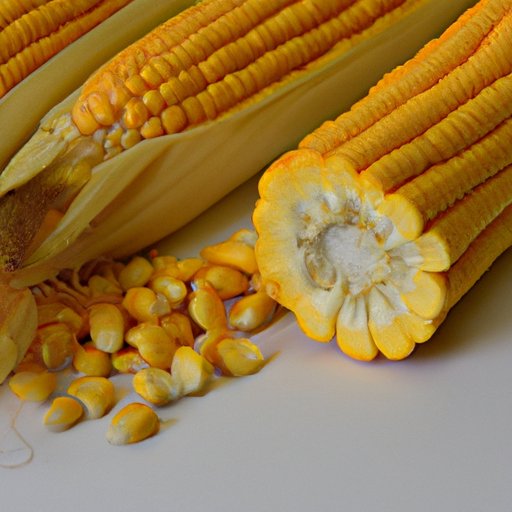Introduction
Corn, or maize, is a staple crop for many cultures around the world. It has been an important part of human diets and economies for thousands of years and its cultivation has had a significant impact on human societies. This article will explore the history of corn, from its origin to its spread around the world and its role in early human societies. It will also look at the environmental impacts of large-scale corn production.
Historical Timeline of Maize/Corn
The origin of corn dates back thousands of years. According to archaeological evidence, corn was first domesticated in Mexico about 9,000 years ago. It is thought to have been developed from a wild grass called teosinte, which is still found in parts of Mexico today. From there, it began to spread throughout Central and South America, eventually reaching North America by 2,000 BC.
The spread of corn cultivation around the world continued throughout the centuries. By the 16th century, corn had become an important crop in Europe, Asia, and Africa. Today, corn is grown in almost every country in the world. Modern varieties of corn differ significantly from ancient varieties, as they have been bred over time to be more productive and better adapted to local climates.
Role of Corn in Early Human Societies
Corn has long been an important part of traditional diets and lifestyles. In many cultures, it has served as a primary source of nutrition, providing essential carbohydrates, proteins, and fats. It has also been used as a form of currency and as a ritual offering to gods and spirits. In addition, corn has played an important role in the development of many cultures and civilizations. For example, in Mesoamerica, corn was an integral part of Aztec and Mayan culture, with corn symbols appearing in artwork and religious ceremonies.
The economic and social implications of corn production cannot be underestimated. Corn has been a major factor in the growth of economies, providing food and income for farmers and workers. It has also impacted social structures, with some cultures developing elaborate systems of land ownership and inheritance based on corn production. As such, corn has been an important part of human societies for thousands of years.
Environmental Effects of Large-Scale Corn Production
While corn has long been an important part of human societies, the large-scale production of corn has had a significant environmental impact. The intensive use of fertilizers and pesticides has led to soil degradation and water pollution, while monoculture farming practices have resulted in a loss of biodiversity in many areas. Additionally, modern corn varieties require large amounts of water, leading to further depletion of natural resources.
There are some possible solutions for reducing the environmental impact of corn production. One option is to switch to organic farming techniques, which rely on natural processes rather than chemical inputs. Another option is to promote agroforestry systems, which involve planting trees alongside crops to provide shade and protect against erosion. Finally, governments could support small-scale farmers and encourage sustainable agricultural practices.
Conclusion
In conclusion, corn has been an important part of human societies for thousands of years. It has provided food, income, and cultural identity for generations of people around the world. However, the large-scale production of corn has had a significant environmental impact, which must be addressed if we are to continue to reap the benefits of this vital crop. There are some potential solutions, but ultimately it is up to governments and individuals to ensure that corn production is sustainable and responsible.
(Note: Is this article not meeting your expectations? Do you have knowledge or insights to share? Unlock new opportunities and expand your reach by joining our authors team. Click Registration to join us and share your expertise with our readers.)
